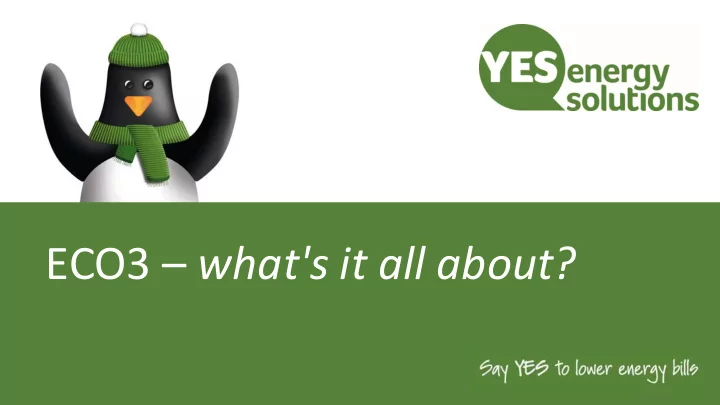

ECO3 – what's it all about?
What is ECO? The Energy Company Obligation (ECO) launched in 2013. The largest Government backed domestic energy efficiency programme in GB. Major energy companies are obligated to fund energy efficiency measures to reduce CO 2 and alleviate fuel poverty.
Obligated utilities Each energy company is set an ECO delivery target. The more customers – the larger the target. They must achieve a set amount of Life Time Savings (LTS) through the measures they fund.
How targets are achieved Each obligated energy company either: • Funds their own internal installer divisions • Funds installers directly • Sells off their obligations to other obligated energy companies • Funds managing agents that work with multiple installers
How ECO funding is calculated Every measures is assigned a Energy companies assign a Deemed Score (LTS). Funding Rate (£ per LTS): The score is determined by: • Measure Funding Rate X Deemed Score • Property type = Available Funding • Wall construction • Number of bedrooms • Existing heating system
Funding example New boiler replacement in a 3 bedroom semi-detached house with cavity walls and an old broken down gas boiler: Deemed Score = 12,319 Funding Rate = £0.08 Funding Allocation = £985.52 Typical install cost = £1,600 Customer contribution = £614.48
ECO3 ECO3 is the next phase of the programme: Oct 2018 – March 2022 . Previous phases: ECO1: April 2013 – March 2015 ECO2: April 2015 – March 2017 ECO2t (transition phase): April 2017 – Sept 2018 ECO3 – signed off by Government on 4 th Dec 2018
So what's new? • More Energy Companies obligated • 100% HHCRO (CERO is axed) • HHCRO benefit criteria broadened • Social Housing – more opportunities • Restrictions on Private Sector Landlords • Changes to boiler funding • 15% rural sub-obligation • Solid Wall Minimum – at least 17,000 properties • New Deemed Scores (with uplifts for certain situations) • No ECO with RHI – apart from Ground Source Heat Pumps • New innovation funding strand
100% HHCRO Focus on vulnerable people in or at risk of fuel poverty. Benefits Private owner / occupier LA Flex Registered social landlord Social Housing
HHCRO Benefits Existing benefits New benefits Pension Guarantee Credit Disability Living Allowance Income Based Job Seekers Allowance Personal Independence Payment Income Support Attendance Allowance Income Related Employment & Carer's Allowance Support Allowance Severe Disablement Allowance Working Tax Credit* Industrial Injuries Disablement Benefit Child Tax Credit* War Pensions Mobility Supplement Universal Credit* Constant Attendance Allowance Armed Forces Independence Payment *Income thresholds now removed Child Benefit (income thresholds apply)
HHCRO LA Flex 25% of ECO targets can be delivered through LA Flex. Councils set their own criteria around: • Residents at risk of fuel poverty • Residents with health conditions made worse by living in cold homes Councils must publish a Statement of Intent (SoI) defining their criteria. Many have followed the NICE guidance.
Private landlord restriction Landlords can’t use ECO to meet MEES (Minimum Energy Efficiency Standards) requirements. Only households in EPC band E or above can receive ECO funding. Or band F or above for Solid Wall Insulation.
HHCRO Social Housing Properties in EPC band E, F or G can qualify for support. • No personal qualification required • Measures restricted to insulation and first time central heating (FTCH) • Electric storage heater restriction removed for FTCH
Funding for boilers Broken heating system cap Funding to upgrade broken boilers / heating systems – capped at 35,000 installs per year. This is only available to homeowners. Heating system upgrades Inefficient boilers and heating systems can also receive funding but at a lower rate. Each install must be coupled with a primary insulation measure (excluding loft insulation).
First time central heating Properties with no form of central heating qualify (e.g. no radiators). Any existing electric storage heaters must be broken or deemed inefficient (responsive rating of 0.2 or less) Gas, LPG and renewable heat technologies can be used. Oil is excluded.
Rural Rural sub-obligation introduced. Obligated energy companies must meet 15% of their ECO target in rural communities. Uplifts provided on insulation measures.
Solid Wall Insulation Minimum Collectively, obligated energy companies must fund 17,000 solid wall insulation installs per year. More flexibility to meet obligation (using other insulation measures). In-fill mechanism introduced to support EWI schemes.
Innovation Innovation – a measure or technique that is new to the market that has not had wide-scale roll out. Energy companies can fund up to 10% of their ECO targets through the innovation stand. Social Housing in EPC Band D can be included. Slow roll out for innovation expected.
Uplifts Certain measures will receive uplifts in their deemed scores in certain circumstances: • Insulation measures in rural areas get an uplift • Measures funded through LA Flex installed in properties in EPC Band F or G receive an uplift • All ‘innovation’ measures will receive an uplift
Blending funding In many cases ECO won’t fully cover install costs. Council Local Authorities need to start thinking creatively about how they implement ECO WHF energy efficiency schemes through a blended funding approach. GNO Grant
Say ‘YES’ YES Energy Solutions can help Local Authorities develop effective energy saving schemes using ECO and other funding channels. • Experienced project managers • ECO3 funding in place • Dedicated funding team • National network of SME installers • Strong links with Energy Companies, Installers, Manufacturers and Community Organisations
Ethical approach As a CIC, we have no shareholders, so invest the profit we make in our social mission: Reducing CO 2 & Alleviating Fuel Poverty
Award Winners Our proactive collaborations have been applauded by the wider industry. National Energy Efficiency West Midlands Energy Efficiency Women in Housing Awards – Awards 2018 – Funding Provider Awards – Regional Large Scale Finance, Compliance of Governance of the Year Project (>250k) of the Year Team of the Year
Thank You Any questions? YES Energy Solutions T: 01422 880100 W: www.yesenergysolutions.co.uk
Recommend
More recommend